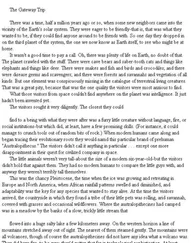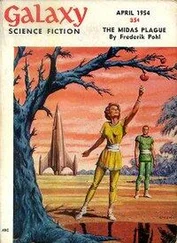Pohl, Frederik - The Age of the Pussyfoot
Здесь есть возможность читать онлайн «Pohl, Frederik - The Age of the Pussyfoot» весь текст электронной книги совершенно бесплатно (целиком полную версию без сокращений). В некоторых случаях можно слушать аудио, скачать через торрент в формате fb2 и присутствует краткое содержание. Жанр: Старинная литература, на английском языке. Описание произведения, (предисловие) а так же отзывы посетителей доступны на портале библиотеки ЛибКат.
- Название:The Age of the Pussyfoot
- Автор:
- Жанр:
- Год:неизвестен
- ISBN:нет данных
- Рейтинг книги:4 / 5. Голосов: 1
-
Избранное:Добавить в избранное
- Отзывы:
-
Ваша оценка:
- 80
- 1
- 2
- 3
- 4
- 5
The Age of the Pussyfoot: краткое содержание, описание и аннотация
Предлагаем к чтению аннотацию, описание, краткое содержание или предисловие (зависит от того, что написал сам автор книги «The Age of the Pussyfoot»). Если вы не нашли необходимую информацию о книге — напишите в комментариях, мы постараемся отыскать её.
The Age of the Pussyfoot — читать онлайн бесплатно полную книгу (весь текст) целиком
Ниже представлен текст книги, разбитый по страницам. Система сохранения места последней прочитанной страницы, позволяет с удобством читать онлайн бесплатно книгу «The Age of the Pussyfoot», без необходимости каждый раз заново искать на чём Вы остановились. Поставьте закладку, и сможете в любой момент перейти на страницу, на которой закончили чтение.
Интервал:
Закладка:
If he were dead?
He took a deep breath and marched back to the DR car. As he had thought, the side of it was emblazoned with the caduceus of the WEST ANNEX CENTER.
He demanded, “Machine, are you really operating out of the West Annex Center?”
The robot glared into his eyes. “Man Forrester! Your arrest has been ordered. Would you like a precis of the charge against you?”
“What I would like,” said Forrester tightly, “is an insurance policy. But I guess I’ll have to take a chance this one time without one. Let’s hope it’s only your speaking circuits that are messed up!”
What he wanted he knew he would find in the flier. He reached into it, fumbled through the nest of first-aid equipment.
The thing he wanted turned up in the first case he opened: a four-inch scalpel, razor sharp. He stared at it glumly, hesitated, searched again until he found a writing stylus and a square of cardboard. Carefully he lettered a sign:
REVIVE ME AT ONCE!
I can tell you what the Sirians are up to.
He pinned it neatly to his shirt front. Then . . .
“Machine!” he cried. “Do your duty!” And with a rapid motion he slit his throat.
The pain was astonishing, but it lasted for only a moment. And then the world roared thinly at him and slipped dizzyingly away.
Eighteen
“I was dreaming,” murmured Forrester into the warm, comfortable darkness, “of committing suicide. Funny I should cut my throat, though. I want to live. . . .”
“You’ll live, Chuck,” said a familiar voice. Forrester opened his eyes and gazed into the eyes of Hara.
He thrust himself up. “Taiko!” he cried. “The Sirians! I’ve got to tell you what they’re doing!”
Hara pressed him back down on the bed. “You already told us, Chuck. They’re taken care of. Don’t you remember?”
“Remember?” But then he did remember. He remembered being awake, with a nightmarish pain in his throat, trying by gesture and sign language to communicate something, until at last someone had had the wit to bring stylus and paper and he’d written out a message. He laughed out loud. “Funny! I never thought that with my throat cut it’d be hard to tell you anything.”
“But you did, Chuck. The Sirians are under personal human guard, every one of them immobilized and cut off from communication. And Taiko’s talking as fast as he can to a computer team, telling them what he did so they can undo it. They’ve already got all the basic utilities back.” Hara stood up, fished in a pocket, proudly produced a pack of cigarettes. “Here,” he said. “See how your new throat lining stands up to these.”
Forrester gratefully accepted a light. It felt all right as he drew in; he reached up and touched his throat, found it covered with soft plastic film.
“That’ll come off today,” said Hara. “You’re about ready to go back to population. We’ve already revived close to twenty-five percent of the recent freezees. They’ll really be interested in you.”
“Oh,” said Forrester, dampened. “I guess they will, at that. What’s the penalty for letting the Sirian escape?”
“About equal to the reward for letting us know about Taiko,” said Hara cheerfully. “Don’t worry about it.”
“Well, how about if I worry about what the Sirians are going to do?” asked Forrester.
Hara waved a hand. “Be my guest,” he said. “Only bear in mind that Taiko’s little friends were pretty high when he was dismantling Central Computation, and they’re pretty low now. I don’t think they’ll find us an easy target.”
He turned toward the door. “Get yourself checked out,” he ordered. “Then I want to talk to you before you leave here.”
“About my throat?”
“About your girl,” said Hara.
Hours later, Forrester was standing where he had stood before, outside the main entrance to the West Annex Discharge Center. For old time’s sake he flipped a cigarette to the ground and watched the tiny bright cleaner robot whisk it up and away.
Clearly, Central Computation was back on the job.
He turned as Hara joined him. “What about my girl?” he demanded.
“Well . . .” Hara hesitated. “It’s tough to know how to talk to you survivors of the kamikaze era,” he said. “You’re sensitive about the strangest things. For instance, Adne said she thought you resented the fact that I was the father of one of her kids.”
“One of them!” Forrester squawked, severely trying his new throat lining. “Holy God! I at least thought they’d have the same father!”
“Why, Chuck?”
“Why? What do you mean, why? The girl’s a trollop!”
“What’s a trollop?” As Forrester hesitated, Hara pressed on. “In your time, maybe that was something bad. I don’t know; I’m not a specialist in ancient history. But you aren’t in your time any more, Chuck.”
Forrester gazed thoughtfully at Hara’s patient, weary face. But it was more than he wanted to accept. “I don’t care,” he said angrily. “I can’t help thinking maybe Taiko was right. Somewhere the human race took a wrong turning!”
“Well,” said Hara, “actually, that’s what I wanted to tell you. Chuck, there’s no such thing as a wrong turning. You can’t rewrite the history of the race; it happened; this is the result. If you don’t like it, there’s no reason why you can’t try to persuade the world to change again. To something different—anything! Whatever you like. But you can’t go back.”
He patted Forrester’s shoulder. “Think,” he advised. “Let your brain decide what’s right and wrong, not what’s left of your boyhood training. Because all that is dead. . . . And, oh, yes. One other thing,” he mentioned. “I checked the schedules. We’re reviving them pretty fast now, and it ought to be Adne’s turn in about two days.”
And he was gone.
Forrester stared after him. It would be hard, he thought, but it would be possible. And, after all, he had very little choice.
So Forrester hailed a flier and ordered it to take him to a suitable dwelling in Shoggo, determined to face the future. Which, as it turned out, was very fortunate, since he had a lot of future to face—not just a few days or years, but, with the help of a few more visits to the freezer, a fair number of millennia, in all of which he was alive, and active, and well.
For he lived happily ever after. And so did they all.
Author’s Note
Once upon a time, a quarter of a century or so ago, I was a weatherman for the United States Army Air Force in Italy. It was my first experience in the art of predicting real-time events—that is, in the kind of prediction where money, and lives, are bet on its accuracy.
This was a long time before the advent of the computer and the facsimile machine and TIROS and all the other handy little gadgets that have since come reasonably close to turning meteorology into an exact science. Still, we had our gadgets even then, quite a few of them. Our group weather officer, in my part of the Fifteenth Air Force, was a disheveled captain who smiled and nodded a lot, but rarely spoke. He would hum to himself for an hour or two as he pored over the teletype reports and the synoptic map and the adiabatic charts and the PIREPS. Then he would go out to the instrument shelter and swing the psychrometer and tap the aneroid barograph with his fingernail. And then he would climb on the roof of the station and perhaps he would see, off on the horizon, a cloud no bigger than a man’s hand; and he would say, “Ha! Looks like rain,” and come back and make a bad-weather forecast for the pilots of the B-24s.
Actually, that’s the way to write science fiction. (Well, one kind of science fiction. There are many varieties of the science fiction experience!) First you do your homework with the books and the scientific journals. Then you talk to the astronomers and biochemists and computer people, and if you’re lucky perhaps they’ll let you play with their machines and look through their lenses. And then you get up on a high place and look at the world around you.
Читать дальшеИнтервал:
Закладка:
Похожие книги на «The Age of the Pussyfoot»
Представляем Вашему вниманию похожие книги на «The Age of the Pussyfoot» списком для выбора. Мы отобрали схожую по названию и смыслу литературу в надежде предоставить читателям больше вариантов отыскать новые, интересные, ещё непрочитанные произведения.
Обсуждение, отзывы о книге «The Age of the Pussyfoot» и просто собственные мнения читателей. Оставьте ваши комментарии, напишите, что Вы думаете о произведении, его смысле или главных героях. Укажите что конкретно понравилось, а что нет, и почему Вы так считаете.












